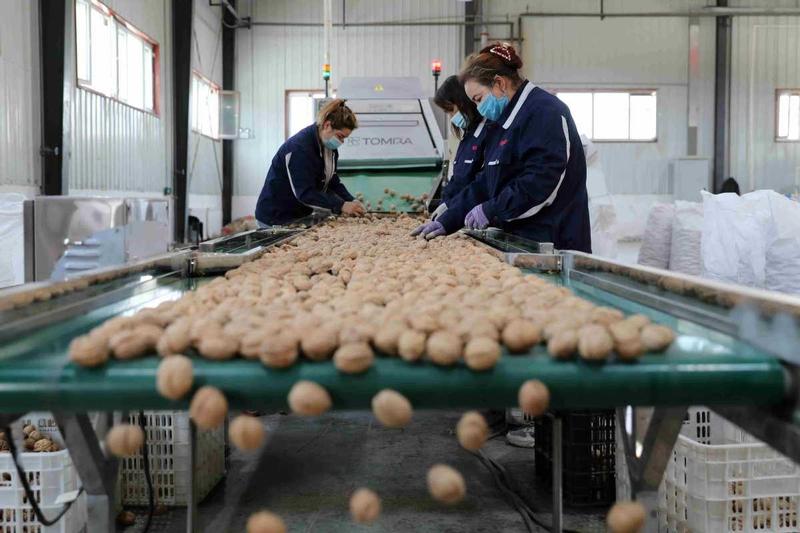 Workers inspect the quality of walnuts at a wholesale trade center in Yecheng county, Xinjiang Uygur autonomous region, on Sept 23. (WANG ZHUANGFEI / CHINA DAILY)
Workers inspect the quality of walnuts at a wholesale trade center in Yecheng county, Xinjiang Uygur autonomous region, on Sept 23. (WANG ZHUANGFEI / CHINA DAILY)
Thanks to processing technologies, a lot of the common food in the Xinjiang Uygur autonomous region, including walnuts, apricots and dairy products, have been playing a bigger role in helping residents out of poverty.
Tursuniyaz Awut has grown walnuts at home for a long time, but he said he did not know what value the nut had except for eating until he began working in a farming industrial park in Yinsa in Xinjiang's Kashgar prefecture last year.
"The work let me know that walnuts, a very common food in my hometown, can become walnut oil and different kinds of snacks after being extracted," added the 30-year-old from the Uygur ethnic group, who can make about 2,500 yuan (US$370) per month by peeling and processing walnuts with machines.
Zurgul Tore said she has the same feeling. "I have apricot trees at home, but in the past my family's income mainly came from growing traditional crops, such as corn and wheat, because we had no idea how to utilize the fruit," she said.
"If we couldn't eat all the apricots, we would have to see them rot and then throw them away. I was troubled by the waste, but I had no choice," the 27-year-old said. "I also tried selling apricots myself, but the price was low, only about 1 yuan for a kilogram."
She has not been worried about the fruit's utilization, purchase and promotion since she learned about an agricultural technology company in Yinsa in 2017.
The company not only provides training in cultivating high-quality apricots for farmers to help them increase the fruit's purchase price, but also offers them employment.
"We make apricot-related products, such as apricot slices and jams, in line with orders and the demands of buyers, so farmers don't need to be concerned about the sales," said Wang Yuqian, chairwoman of the company, established in 2015.
So far, the company has employed some 300 farmers, of whom about 60 percent are from impoverished families, according to Wang.
She highlighted the importance of technological applications in processing, saying it is crucial to adding value to such common fruit.
I never thought the fruit I used to eat or even throw away would be the key to helping me out of poverty.
Zurgul Tore, an apricot grower
"We're upgrading our processing facilities and studying new processing techniques, such as baking and freeze-drying, because our aim is to utilize every part of an apricot to create more added value," she said.
After mastering the techniques, Zurgul said, her family's apricots can be sold for 5 to 10 yuan per kilogram, and she can also earn about 2,500 yuan per month by inspecting the quality of apricot-related products in the company.
"I never thought the fruit I used to eat or even throw away would be the key to helping me out of poverty," she added.
ALSO READ: Xinjiang villagers see huge changes after relocation
In the autonomous region's Lop county, a dairy company is also intensifying efforts in diversifying products.
After seeing the possibilities with processed dairy, Tunisakhan Tursuniyaz sent her cows to the company for breeding and can earn a yearly bonus of 2,500 yuan.
She said she is improving her breeding techniques in the dairy farm and is confident she will shake off poverty by the end of this year.
Dairy products such as yogurt and milk powder are popular in Xinjiang, "so trying our best to boost breeding and processing techniques and improve product quality are important, so that we can contribute to industrial development and ensure farmers increase their incomes," according to Liu Xiaojun, who is in charge of the company's breeding base.
Now, the company employs 53 people, of whom 33 are impoverished, Liu said, adding they are developing new processing projects to offer another 300 jobs as well as services for locals.
READ MORE: Xinjiang spurs tourism revival after overcoming virus outbreak
Wang, from Yinsa, stressed the significance of the knowledge her community has gained.
"In the past, we were just porters of nature, underestimating the values of common food and without awareness of processing," she said. "But after years of technological research, we've begun attaching importance to processing, discovering that common food can play a bigger role in helping people out of impoverishment and live better lives."
Contact the writers at caoyin@chinadaily.com.cn


